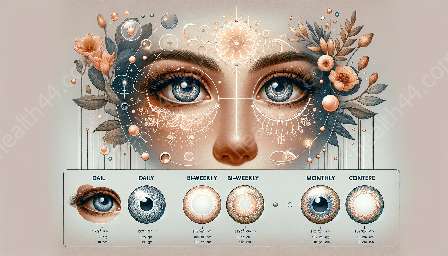Contact lenses have become a popular and convenient vision correction option for many individuals. However, the comfort and acceptance of these lenses are influenced not only by physical factors such as fit and material but also by various psychological factors.
The Influence of Psychological Factors
1. Perceived Comfort: The perception of comfort plays a significant role in the acceptance of contact lenses. Individuals' subjective feelings of comfort can be influenced by their expectations, previous experiences, and sensory perceptions.
2. Body Image and Self-Perception: Contact lenses are not just a vision correction tool but also a part of the wearer's appearance. Therefore, individuals' body image and self-perception can impact their comfort and acceptance of contact lenses. A positive self-image may lead to greater comfort and acceptance, while negative self-perception may act as a barrier.
3. Anxiety and Fear: Some individuals may experience anxiety or fear related to the usage of contact lenses, which can hinder their comfort and willingness to continue using them. Fear of inserting or removing the lenses, fear of eye infections, or fear of losing the lenses can all contribute to discomfort and decreased acceptance.
The Role in Contact Lens Research and Innovation
Understanding the psychological factors influencing comfort and acceptance of contact lenses is crucial for contact lens research and innovation. Researchers and manufacturers aim to create contact lenses that not only provide optimal vision correction but also prioritize comfort and address the psychological aspects of wearing contact lenses.
1. Design and Material Innovation:
Insights into psychological factors help in the development of contact lens designs and materials that enhance comfort and promote acceptance. For example, lenses designed to minimize discomfort during extended wear or materials that mimic the natural moisture levels of the eye can improve the overall experience for wearers.
2. Education and Support:
Psychological factors also highlight the importance of education and support for contact lens wearers. Providing comprehensive information about proper lens care, addressing fears and anxieties, and offering ongoing support can positively impact wearers' comfort and acceptance.
Conclusion
Psychological factors play a significant role in the comfort and acceptance of contact lenses. These factors not only influence individual experiences but also guide the direction of contact lens research and innovation. By considering and addressing psychological aspects, the contact lens industry can continue to enhance the comfort and acceptance of contact lenses for a diverse range of wearers.





















